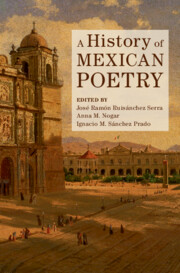Book contents
- A History of Mexican Poetry
- A History of Mexican Poetry
- Copyright page
- Contents
- Figures
- Contributors
- Introduction
- Chapter 1 The Practice of Epic and Lyric Writing in Colonial Mexico
- Chapter 2 La lírica del Fénix: Sor Juana’s Poetic Legacy
- Chapter 3 The Sound of the Word: Music and Social Transgression in Lyric Poetry from the Colonia Onward
- Chapter 4 We, the Romantics
- Chapter 5 Sentimental Sociabilities: The Young Romantics and Their Long-Lived Widows
- Chapter 6 Modernismo’s Strategic Occidentalism: Notes on Manuel Gutiérrez Nájera, Amado Nervo, and José Juan Tablada
- Chapter 7 The Crepusculars: Criollo Modernism and the Invention of the Literary Province
- Chapter 8 Poesía en voz alta: A Trajectory of Poetry and Performance in México
- Chapter 9 The Great Synthesis of the Critical Poets: The Rise of Octavio Paz
- Chapter 10 Octavio Paz and the Institutions of Poetry
- Chapter 11 The Form That Contains Multitudes: The Mexican Long Poem (1924–2020)
- Chapter 12 Radical Freedoms: Neobaroque, Postpoetry
- Chapter 13 The Age of Anthology
- Chapter 14 Twentieth-Century Mexican Poetry: The Popular and the Political
- Chapter 15 Poetry in Indigenous Languages: From the Sixteenth to the Twenty-First Centuries
- Chapter 16 Chicanx Poetry: The Living Lyric
- Chapter 17 Racimos: Dissonances in Mexican Poetry of Today
- Index
- References
Chapter 14 - Twentieth-Century Mexican Poetry: The Popular and the Political
Published online by Cambridge University Press: 21 March 2024
- A History of Mexican Poetry
- A History of Mexican Poetry
- Copyright page
- Contents
- Figures
- Contributors
- Introduction
- Chapter 1 The Practice of Epic and Lyric Writing in Colonial Mexico
- Chapter 2 La lírica del Fénix: Sor Juana’s Poetic Legacy
- Chapter 3 The Sound of the Word: Music and Social Transgression in Lyric Poetry from the Colonia Onward
- Chapter 4 We, the Romantics
- Chapter 5 Sentimental Sociabilities: The Young Romantics and Their Long-Lived Widows
- Chapter 6 Modernismo’s Strategic Occidentalism: Notes on Manuel Gutiérrez Nájera, Amado Nervo, and José Juan Tablada
- Chapter 7 The Crepusculars: Criollo Modernism and the Invention of the Literary Province
- Chapter 8 Poesía en voz alta: A Trajectory of Poetry and Performance in México
- Chapter 9 The Great Synthesis of the Critical Poets: The Rise of Octavio Paz
- Chapter 10 Octavio Paz and the Institutions of Poetry
- Chapter 11 The Form That Contains Multitudes: The Mexican Long Poem (1924–2020)
- Chapter 12 Radical Freedoms: Neobaroque, Postpoetry
- Chapter 13 The Age of Anthology
- Chapter 14 Twentieth-Century Mexican Poetry: The Popular and the Political
- Chapter 15 Poetry in Indigenous Languages: From the Sixteenth to the Twenty-First Centuries
- Chapter 16 Chicanx Poetry: The Living Lyric
- Chapter 17 Racimos: Dissonances in Mexican Poetry of Today
- Index
- References
Summary
Certain poetic practices in Mexico which have traditionally received less attention from scholars have recently regained currency, and even urgency in poetic critique. This chapter explores the openly political and popular underside of twentieth-century Mexican poetry, starting with the Estridentismo movement and moving on to works by José Emilio Pacheco, Eduardo Lizalde, Renato Leduc, Efraín Huerta, Rosario Castellanos, Jaime Sabines, Francisco Hernández, Jaime Reyes, and Ricardo Castillo, among others, as well as the political poetry recently reprinted in the twenty volumes of the Archivo negro de la poesía mexicana. The chapter also examines two significant but historically silenced trends: poetry written by women and literature in Indigenous languages.
- Type
- Chapter
- Information
- A History of Mexican Poetry , pp. 258 - 274Publisher: Cambridge University PressPrint publication year: 2024



